

La Revolution Des Sols Vivants. Vers un verger agroforestier ? - Evelyne Leterme, conservatoire végétal d'Aquitaine. LombriCompost. Towards Efficient Land Use in Brazil - CPI. Executive Summary Increasing global demand for food and the need to address climate change risk make it ever more urgent to both protect ecosystems and use land more productively and efficiently.
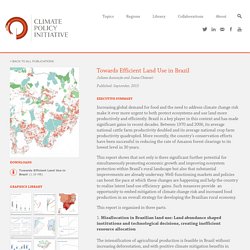
Brazil is a key player in this context and has made significant gains in recent decades. Between 1970 and 2006, its average national cattle farm productivity doubled and its average national crop farm productivity quadrupled. More recently, the country’s conservation efforts have been successful in reducing the rate of Amazon forest clearings to its lowest level in 30 years. This report shows that not only is there significant further potential for simultaneously promoting economic growth and improving ecosystem protection within Brazil’s rural landscape but also that substantial improvements are already underway. This report is organized in three parts. 1.
Together these processes have created a massive misallocation problem in Brazilian land use. 2. The Impact of Cash Transfers on the Economic Advancement, Decision-Making and Capacity of Women. Soils in the water cycle Lombricompostage : compostage par les vers - ComprendreChoisir. Guide-des-ressources-en-Agriculture-urbaine-Final.pdf. Agriculture urbaine : ce dont elle est capable (et ce qu'elle ne pourra jamais faire) ALIMENTATION - Qui se souvient encore qu'il y a moins de 150 ans, Paris était encore entourée de fermes, d'élevages, bref d'une ceinture agricole qui nourrissait la ville...

Ou encore que deux siècles plus tôt, la capitale était parsemée de champs, et même de pâturages où paissaient vaches et cochons? Plus grand monde. Depuis, l'invention du chemin de fer et du camion frigorifique ont repoussé l'agriculture loin des villes, et parfois même à l'autre bout du monde. Mais l'agriculture dans la ville appartiendrait-elle nécessairement au passé? Pas forcément. Lire aussi:» Les candidats aux municipales rhabillent la Seine » Une ferme dans un bunker en plein cœur de Londres » BLOG Plantation sur les toits, futur de l'agriculture et de l'urbanisme?
"L'agriculture urbaine, c'est l'idée d'une agriculture tournée vers la ville, qui utilise des ressources, des déchets et une main d'oeuvre de la ville", résume Jeanne Pourias, doctorante à l'école AgroParisTech. Rendre la ville plus durable ? Cet homme suspend ses plantes à l’envers sur sa terrasse. Du n’importe quoi? Regardez mieux. Le jardinage est un bon passe-temps en été, même quand cela concerne uniquement quelques pots de fleurs sur une terrasse.
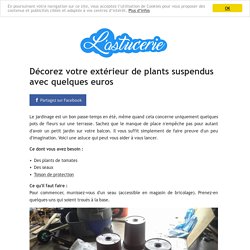
10 companies feeding the urban farming boom. Gone are the days of urban farming as a quirky hobby rather than a viable channel for food production.
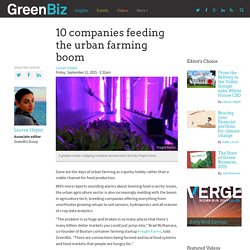
With more reports sounding alarms about looming food scarcity issues, the urban agriculture sector is also increasingly melding with the boom in agriculture tech, breeding companies offering everything from unorthodox growing setups to soil sensors, hydroponics and all manner of crop data analytics. ICT is changing agriculture: interview with Simone Sala. Simone Sala likes describing himself as "a traveller across Global Development, Agriculture, Environment, and Security via Technology".
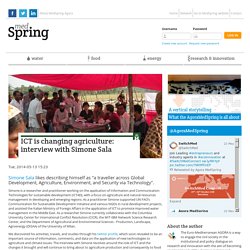
» BalcompostCraque-Bitume. Visionner un vidéo sur le balcompost!
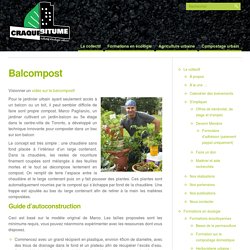
Fabriquer un lombricomposteur - Compost. Comment faire un jardin en permaculture ? Avant de parler de jardin en permaculture, rappelons que la permaculture est bien plus qu’une nouvelle approche du jardinage, c’est une philosophie de vie où animaux, insectes, êtres humains, plantes et micro-organismes vivent en harmonie dans un environnement sain et auto-suffisant.
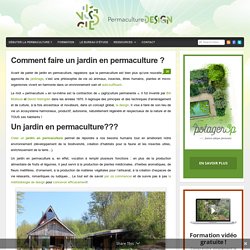
Le mot « permaculture » en lui-même est la contraction de « (agri)culture permanente ».
Histoire de la domestication 3/3. Les débuts de l'élevage. Biosphère. Conservatoire Végétal d'Aquitaine - Marc DUFUMIER. Conférence Agroécologie/Agroforesterie Marc Dufumier. Fred Kirschenmann - Transforming Agriculture. Environmental ethics. Environmental ethics is the part of environmental philosophy which considers extending the traditional boundaries of ethics from solely including humans to including the non-human world.
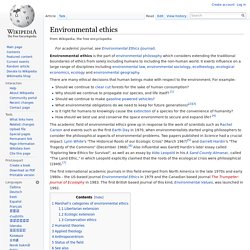
Deep ecology. Deep ecology is a contemporary ecological and environmental philosophy characterized by its advocacy of the inherent worth of living beings regardless of their instrumental utility to human needs, and advocacy for a radical restructuring of modern human societies in accordance with such ideas.
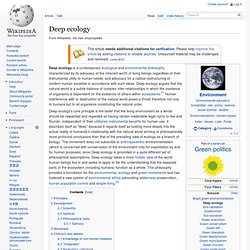
Deep ecology argues that the natural world is a subtle balance of complex inter-relationships in which the existence of organisms is dependent on the existence of others within ecosystems.[1] Human interference with or destruction of the natural world poses a threat therefore not only to humans but to all organisms constituting the natural order. Deep ecology's core principle is the belief that the living environment as a whole should be respected and regarded as having certain inalienable legal rights to live and flourish, independent of their utilitarian instrumental benefits for human use. Principles[edit] These principles can be refined down into three simple propositions:
Masanobu Fukuoka - La révolution d'un seul brin de paille signé. Ecofascism. Ecofascism is the combination of fascist politics with support for ecological concerns.[1][2][3] Definition[edit]
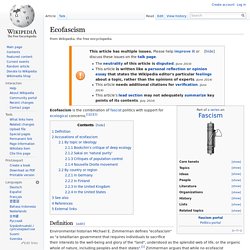
Écofascisme. Holmes Rolston, III. Holmes Rolston III. Holmes Rolston III (born November 19, 1932) is a philosopher who is University Distinguished Professor of Philosophy at Colorado State University. He is best known for his contributions to environmental ethics and the relationship between science and religion. Among other honors, Rolston won the 2003 Templeton Prize, awarded by Prince Philip in Buckingham Palace. He gave the Gifford Lectures, University of Edinburgh, 1997-1998. The Darwinian model is used to define the main thematic concepts in Rolston's philosophy and, in greater depth, the general trend of his thinking.[1] Quotes[edit] Life[edit]
Peter Singer. J. Baird Callicott. René Descartes. Descartes laid the foundation for 17th-century continental rationalism, later advocated by Baruch Spinoza and Gottfried Leibniz, and opposed by the empiricist school of thought consisting of Hobbes, Locke, Berkeley, and Hume. Leibniz, Spinoza and Descartes were all well versed in mathematics as well as philosophy, and Descartes and Leibniz contributed greatly to science as well.
His best known philosophical statement is "Cogito ergo sum" (French: Je pense, donc je suis; I think, therefore I am), found in part IV of Discourse on the Method (1637 – written in French but with inclusion of "Cogito ergo sum") and §7 of part I of Principles of Philosophy (1644 – written in Latin). Early life[edit] Jean-Jacques Rousseau.
Jean-Jacques Rousseau (/ruːˈsoʊ/;[1] French: [ʒɑ̃ʒak ʁuso]; 28 June 1712 – 2 July 1778) was a Genevan philosopher, writer, and composer of the 18th century. His political philosophy influenced the French Revolution as well as the overall development of modern political, sociological, and educational thought. Biography[edit] Youth[edit] Rousseau was born in Geneva, which was at the time a city-state and a Protestant associate of the Swiss Confederacy. Arne Næss. Arne Dekke Eide Næss (AR-nə NASS;[note 1] 27 January 1912 – 12 January 2009) was a Norwegian philosopher who coined the term deep ecology and was an important intellectual and inspirational figure within the environmental movement of the late twentieth century.[6] Næss cited Rachel Carson's 1962 book Silent Spring as being a key influence in his vision of deep ecology.
Næss combined his ecological vision with Gandhian nonviolence and on several occasions participated in direct action. Næss averred that while western environmental groups of the early post-war period had raised public awareness of the environmental issues of the time, they had largely failed to have insight into and address what he argued were the underlying cultural and philosophical background to these problems. He thereby distinguished between what he called deep and shallow ecological thinking.
Life and career[edit] Professor Arne Næss campaigning for the Norwegian Green party in 2003. Henry David Thoreau. Henry David Thoreau (see name pronunciation; July 12, 1817 – May 6, 1862) was an American author, poet, philosopher, abolitionist, naturalist, tax resister, development critic, surveyor, and historian. A leading transcendentalist,[2] Thoreau is best known for his book Walden, a reflection upon simple living in natural surroundings, and his essay Resistance to Civil Government (also known as Civil Disobedience), an argument for disobedience to an unjust state.
Thoreau's books, articles, essays, journals, and poetry total over 20 volumes. Larrère Catherine - Fondation de l'Écologie Politique. Hicham-Stéphane AFEISSA - Fiche personnelle - Nonfiction. The work of Sir Albert Howard. Nature. Un article de Wikipédia, l'encyclopédie libre. La nature est un mot polysémique, qui a plusieurs sens fondamentaux : La composition et la matière d'une chose (ce qu'elle est, son essence) ;L'origine et le devenir d'une chose dans sa spontanéité et sa léthargie temporelle (libre d'une fin, la nature humaine) ;L'ensemble des systèmes et des phénomènes naturels et humains sont aussi reconnus comme des composés de la nature. Ce mot vient du latin natura signifiant "ce qui existe depuis la naissance" ; il évoque donc à ce qui est dans son état natif, c'est-à-dire qui n'a pas été modifié depuis sa naissance.
Le mot naturel qualifie effectivement parfois un objet ou une substance qui n'a pas été transformé, mélangé ou altéré par un artifice quelconque. NATURE : Définition de NATURE. Agriculture biologique - Commission européenne. HOWARD_An_Agricultural_Testament_1943. ROLSTON III_Environmental Ethics: Values in and Duties to the Natural World. Environmental Ethics: Values in and Duties to the Natural World by Holmes Rolston, III Published in: The Broken Circle: Ecology, Economics, Ethics. Darwinian Storied Residence. An introduction to the Work of Holmes Rolston III. Attfield R. (2006). Creation, Evolution and Meaning, Aldershot, Ashgate. Gofffi J-Y. (2000). La valeur symbolique des êtres de nature, in L’éthique environnementale, A. Fagot-Largeaut et P. Acot (eds.), Paris, sens Editions, pp. 113-28. Barbour I. Jackson J. Preston C. & W.
Rolston H. (1975). Rolston H. (1986). MOLLISON_ Permaculture 1_Français_French. Masanobu Fukuoka - La révolution d'un seul brin de paille signé.